This election season had Jeff Zinn “burning up” with an idea to write a futuristic drama about the stakes of this year’s vote. “In a way, I wrote it for myself, although I’ve shown it to a few people,” Zinn says. He is one of many artists, writers, and musicians on the Outer Cape who have been compelled by the presidential election to create work that reflects on this moment.
For some, like Zinn, making a political piece is a personal act, a way to process internal turmoil and fears. But others have used their creative efforts to raise funds for the Democratic campaign.
There is nothing overtly political about George Lynde’s work. He paints domestic scenes and quiet landscapes that convey a contemplative stillness. But his Midday Sun, an image of a solitary orange chair and its shadow, stood for action earlier this month as part of the Artists4Kamala auction at the Greg Salvatori Gallery in Provincetown.
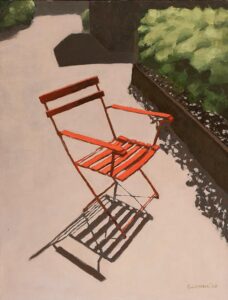
Lynde was the first of 70 Outer Cape artists to donate a painting to the eight-day event that, the gallery reported, raised $176,000 for Harris’s presidential campaign fund.
“It’s the first time I’ve been part of a big event like this,” Lynde says about joining forces with other artists for a cause. He was pleased to do it: “I dread the thought that we could have Donald Trump for another four years,” he says.
Political engagement by artists is certainly not new. One of Robert Motherwell’s most enduring bodies of work, “Elegies to the Spanish Republic,” is a lamentation on the Spanish Civil War in more than 100 paintings. In 1991, Tony Kushner wrote Angels in America, the landmark opus set in New York City as the AIDS crisis was met by Reagan-era intolerance.
This year, local artists are motivated by concerns that run the gamut from the loss of reproductive rights and the scapegoating of immigrants to attacks on artistic freedom and cuts in arts funding. President Trump’s first budget proposed the complete elimination of funding for the National Endowment for the Arts; in Florida, Gov. Ron DeSantis slashed the entire $32-million state arts budget for 2025.
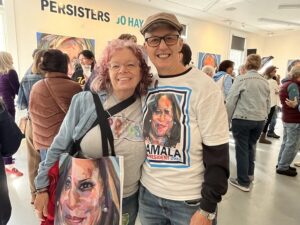
For trans poet and Fine Arts Work Center fellow Acie Clark, this election season is a time of worry, especially for friends and loved ones in their native South.
“Even when I was a queer kid moving through the Florida public school system, there were fewer restrictions than there are now,” Clark says. “The ‘don’t say gay’ laws in Florida have really shaped how I think about the vulnerability of being named.”
Clark sees a writer’s role as that of witness. They are mindful of losses that could result from the election outcome, including the right to gender-affirming health care and freedom of expression. In one poem, Clark writes: “I tilted forward; my body became a room getting smaller and smaller./ Inward I twisted again and again into the blunt knife of the news,/ which isn’t really news, trans people are still evil and sick,/ and the campaign has laid out another plan to solve us: a problem./ The panic didn’t come as a surprise but a rising water in my chest.”
There is optimism among the artists. Provincetown musician Zoë Lewis’s campaign anthem, “Smash,” reflects her excitement about the possibility of Harris’s election. “This could possibly be the moment to smash the glass ceiling,” Lewis says.
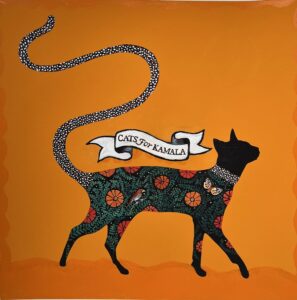
The music video for “Smash” was recorded on Commercial Street in front of Womencrafts, with dozens of women wearing T-shirts adorned with images of artist Jo Hay’s portrait of Kamala Harris. They are dancing, fists raised, and singing along with Lewis as her lyrics proclaim: “There’s an orange man/ who’s running out of juice/ And there’s a fierce Black woman/ She’s on the loose/ And he’s running scared ’cause she’s cut him down to size/ And the clock’s been ticking and the time has come for all of us to rise….”
Lewis is donating the proceeds from downloads of the song to the Harris campaign. She wrote it after being invited to open for the Indigo Girls at a Labor Day weekend concert in Provincetown. “I thought, ‘Here’s my anthem,’ ” she says.
Perhaps the most visible sign of the community’s enthusiasm for the Democratic candidate is found in that close-up portrait of Harris painted in 2020 by Hay. It is part of a series, “The Persisters,” depicting 16 women known for tenacity and courage in politics, sports, and entertainment. The oversize canvases recently adorned the walls at the Provincetown Commons for a Women’s Week exhibition where T-shirts, buttons, and tote bags with Hay’s painting of Harris’s face sold at a brisk pace. Michelle Axelson, the owner of Womencrafts, says Hay’s products at her store and at the Commons netted $10,000 for the campaign.
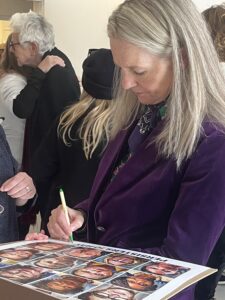
“I had no idea that this T-shirt would be so incredibly popular,” Hay says. “It’s been phenomenal. We had several print runs and couldn’t keep up with the demand. It’s exciting to be part of getting a Black woman elected president of the United States.”
While Hay believes political and social movements for change are “a very natural place for an artist to be,” other artists, including Danielle Mailer, try to avoid the rough and tumble of politics. “I come from a very aggressive and fearless father who loved controversy and going into the eye of the storm,” she says. “As the offspring of Norman Mailer, I have run to a gentler approach.”
Mailer says she made an exception this year when gallerist Berta Walker asked her to contribute to Cats for Kamala, an exhibition that raised funds for get-out-the-vote organizations. For the occasion, she added a banner to a mixed-media work depicting a black cat in a coat of flowers stepping serenely across a bright orange backdrop.
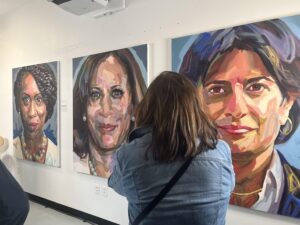
“I wanted to do something that is fun and whimsical but also poked fun at JD Vance’s ‘childless cat ladies’ comment, which is so offensive and alienating,” Mailer says. It’s part of the exhibition at Berta Walker Gallery that runs through Nov. 5.
Jeff Zinn’s mind is on both the past and the future right now. “My son was a young teenager when Donald Trump was elected,” he says. “I remember saying to him, I’ve lived through crazy times. I had a draft number. There was Vietnam. Watergate.” But, he added, “There is nothing like this that has happened in my lifetime.”
Zinn has spent his career working with other people’s scripts as a producer and the former artistic director of the Wellfleet Harbor Actors Theater. This time, the script is his own, with a title that’s a nod to A People’s History of the United States, written by his late father, Howard Zinn. A Time Machine: A People’s History of the Future will have its first reading at the Arts Center in Harwich on Monday, Nov. 4 at 7 p.m.
Regardless of what happens on Nov. 5, many artists don’t think their work will be over.
“I’m thinking, how is this story going to be told later, not just in the now, but when we are able to look back and think about this moment in history,” says Clark. “The work’s not going to be done in November. I don’t think it’ll be done for a long time.”



